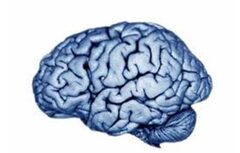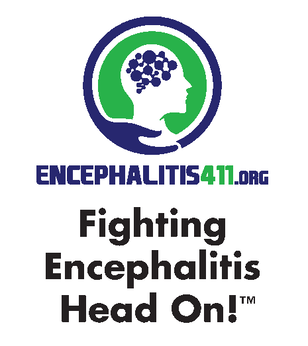overview
Encephalitis is inflammation of the brain caused by either 1) an infectious agent, or 2) an autoimmune process. It can strike anyone, anywhere, at any time, and at any age, resulting in a serious and sometimes life-threatening emergency. An estimated 20,000 Americans are diagnosed annually; ~20% of those cases are fatal.
Those who survive its assault are left with an acquired brain injury, requiring specialized medical treatment and comprehensive rehabilitation from an entire team of skilled professionals. Some types of encephalitis can be subacute, mild, and produce almost no symptoms—just a general feeling of being unwell accompanied by a fever. Other cases can strike overnight, resulting in severe and life-threatening consequences.
Residual symptoms are varied, life-altering, and costly, leaving survivors and their loved ones changed forever.
Those who survive its assault are left with an acquired brain injury, requiring specialized medical treatment and comprehensive rehabilitation from an entire team of skilled professionals. Some types of encephalitis can be subacute, mild, and produce almost no symptoms—just a general feeling of being unwell accompanied by a fever. Other cases can strike overnight, resulting in severe and life-threatening consequences.
Residual symptoms are varied, life-altering, and costly, leaving survivors and their loved ones changed forever.
the patient journey

Patients are often hospitalized for weeks—sometimes months—before their condition stabilizes. Once they are past the acute phase, the lengthy journey of rehabilitation, outpatient check-ups, and long-term recovery begins. A quick diagnosis, appropriate drug therapy, rest, and the right balance of treatment for physical, speech, cognitive and behavioral residuals offer the survivor the greatest likelihood of returning to a productive and fulfilling life.
However, in the absence of well-defined treatment protocols and long-term management practices, survivors are often left to manage their own recovery. They stumble in the dark alongside their caregivers, uncertain of what to do or where to turn for help—all the while suffering with debilitating headaches, paralyzing exhaustion, challenges walking and talking, as well as significant problems with memory and concentration. This is why raising awareness and improving medical understanding amongst the medical community is so important.
However, in the absence of well-defined treatment protocols and long-term management practices, survivors are often left to manage their own recovery. They stumble in the dark alongside their caregivers, uncertain of what to do or where to turn for help—all the while suffering with debilitating headaches, paralyzing exhaustion, challenges walking and talking, as well as significant problems with memory and concentration. This is why raising awareness and improving medical understanding amongst the medical community is so important.
THE AFTERMATH
Encephalitis survivors and caregivers report pervasive and life-altering challenges in the aftermath of an encephalitis diagnosis. According to a report from Encephalitis Global and inspire.com titled I'm Not the Me I Remember: Fighting Encephalitis:
- ~45% never return to work
- ~60% experience compromised multi-tasking abilities
- ~50% struggle with attention deficits
- ~60% face problem-solving difficulties
- ~60% incur challenges with relationships or being in social settings
The complexity of encephalitis: an illustrative case study
Patient A
Patient B
One might think that someone in their 20s would be more likely to survive encephalitis than someone in their 60s. However, as Patient A and Patient B, that assumption would be incorrect. The impact of encephalitis is highly variable and does not always correlate with age, lifestyle, health status, or other demographic information.
Comparing the symptoms of both patients at onset, Patient A's hallucinations and coma are hard to miss—it's obvious something very serious is happening. In contrast, Patient B's symptoms are consistent with the flu and would be easy for ER staff to overlook. This is why Encephalitis411 strives to improve medical provider awareness and education so that everyone afflicted by encephalitis—even those with a milder onset—have a better chance at not just survival but achieving positive long-term outcomes.
- Male in early 60s
- Good health
- Onset: headache, vomiting, diarrhea, hallucinations, coma
- Diagnostics: CAT scan, spinal tap
- Diagnosis: encephalitis within 2 days
- Treatment: immediate Acyclovir
- Outcome: recovered, FT employment 1 year post-onset, retired early
Patient B
- Female in early 20s
- Good health
- Onset: severe headache, fever, fatigue, stomach ache
- Diagnostics: CT, chest X-ray, blood work
- Diagnosis: Flu (discharged twice from ER), seizure disorder, finally diagnosed with herpes simplex encephalitis
- Treatment: Acyclovir 4 days post symptom-onset
- Outcome: dead within 1 week
One might think that someone in their 20s would be more likely to survive encephalitis than someone in their 60s. However, as Patient A and Patient B, that assumption would be incorrect. The impact of encephalitis is highly variable and does not always correlate with age, lifestyle, health status, or other demographic information.
Comparing the symptoms of both patients at onset, Patient A's hallucinations and coma are hard to miss—it's obvious something very serious is happening. In contrast, Patient B's symptoms are consistent with the flu and would be easy for ER staff to overlook. This is why Encephalitis411 strives to improve medical provider awareness and education so that everyone afflicted by encephalitis—even those with a milder onset—have a better chance at not just survival but achieving positive long-term outcomes.
fighting encephalitis head on
Encephalitis results in substantial morbidity and mortality worldwide. Specific causes are identified in less than 50% of cases, in part due to lack of consensus on case definitions, and the lack of standardized diagnostic approaches. Other complicating factors are that often there are no predicting factors, imaging technology is inconclusive and patients may present very different symptoms at the onset.
This underscores the key issues regarding diagnosing and treating encephalitis*:
This underscores the key issues regarding diagnosing and treating encephalitis*:
- More than 50% of cases have an unidentified cause which impedes understanding of prevention or the proper treatment
- Approximately 25% are misdiagnosed, which hampers early treatment and contributes to more pronounced impact
- Approximately 50% do not receive treatments or therapies beyond medications, preventing more optimal recovery


